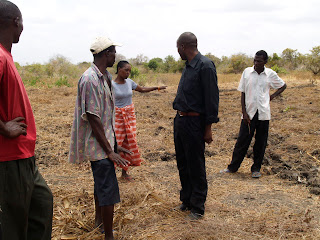Last night we watched a video at Colin's house called "Fruitcake and Ice cream", and had a really long discussion afterward, mostly lead by probing questions about Christianity from yours truly. The video was basically a sermon by this guy named Louie Giglio (see more info here), who is really passionate and interesting to listen to--I only noticed myself drifting away twice, when it is normally more frequent. Louie read a verse from the Bible that holds one of the few basic tenets of Christianity, and it is so simple:
"God made him (Jesus) who had no sin to be sin for us, so that in him (Jesus) we might become the righteousness of God." (2 Corinthians 5:21)As human beings, we tend to complicate matters and want to explain things and know all the answers. This Bible verse basically says that God took Jesus' righteousness and gave it to us freely, and took our sins and placed them on Jesus when he was crucified; this is called Grace, and it is a gift. I asked Colin, how can this be true, how we can not have to do anything to have our sins relieved (because as a gift, Grace is freely given)? This is how we complicate things. It simply is true, but we do have to do one thing to be actually have our sins relieved, and that is to accept this gift of Grace from God. There is no requirement for doing good works, or for paying the Church, or for going to Church every Sunday, or for praying in a certain way, or believing certain things about Evolution or Creation. You simply have to accept this gift of Grace from God.
Now, there are a couple of other tenets that are required to get to this point and to make you a true Christian. First, you have to actually believe that Jesus is the Son of God. Jews and Muslims revere Jesus as a prophet, but not as the Son of God. Second, you have to believe that Jesus died for our sins and was miraculously resurrected. Then from there, you understand what the gift of Grace is and accept it from God to have your sins relieved. No more, no less. The Christians here at Mwamba say that once you get this, actually truly get it, your life will be changed for the better and you'll want to be a better person, because God is embracing you.
Certainly there are hundreds of questions about the details that we, as humans, want answers to. For instance, I want to know if a child dies before it is able to understand and accept the gift from God, can he get into heaven? Or if a person is never exposed to Christianity or the Bible, can she get into heaven? I want answers to these questions, but probably will never get them. Colin said to me that not having these answers should not prevent a person from accepting the gift of Grace from God and having faith that He can make everything right in the world when He so chooses.
Now, back to my original pondering on the problems with the church today. I simply feel that these basic tenets of Christianity are either not taught properly by churches, or they are not fully understood by church-goers, and probably both. There seems to be a lot of division among Christians, about what to believe and what not to believe and who is right or wrong. Is evolution real? Or is creation real? I don't believe they are mutually exclusive, and the Bible also does not show otherwise.
Further, I realize that humans do wrong and we sin, but some of that sin seems to come from people's faith. For instance, Christians sin against homosexuals because they believe the Bible states that homosexuality is wrong. I've read the Sodom and Gomorrah story (Genesis 19) and I don't understand how people can take from that and state that homosexuality is wrong in the eyes of God. Further, Jesus walked with wrong-doers and blessed and healed them, and it is stated that our gift is the poor and helpless. (Little children, let us stop just saying we love people; let us really love them, and show it by our actions. 1 John 3:18) I think Christians in general need to take a long, hard look at their beliefs and go back to what the Bible says, because we have simply strayed too far from the teachings of Jesus. As for myself, I intend to continue learning about Christianity, and I see myself embracing these concepts because I think they are good for the world. I have also been reading other books that are showing me why Christianity is actually different from all other religions, but maybe that should be left for another post.
 |
| Beautiful sunrise yesterday morning. |
 |
| Beautiful flower on the Mwamba Nature Trail. |





















